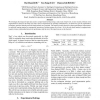Free Online Productivity Tools
i2Speak
i2Symbol
i2OCR
iTex2Img
iWeb2Print
iWeb2Shot
i2Type
iPdf2Split
iPdf2Merge
i2Bopomofo
i2Arabic
i2Style
i2Image
i2PDF
iLatex2Rtf
Sci2ools
132
click to vote
LREC
2010
2010
How Large a Corpus Do We Need: Statistical Method Versus Rule-based Method
We investigate the impact of input data scale in corpus-based learning using a study style of Zipf's law. In our research, Chinese word segmentation is chosen as the study case and a series of experiments are specially conducted for it, in which two types of segmentation techniques, statistical learning and rule-based methods, are examined. The empirical results show that a linear performance improvement in statistical learning requires an exponential increasing of training corpus size at least. As for the rule-based method, an approximate negative inverse relationship between the performance and the size of the input lexicon can be observed.
| Added | 29 Oct 2010 |
| Updated | 29 Oct 2010 |
| Type | Conference |
| Year | 2010 |
| Where | LREC |
| Authors | Hai Zhao, Yan Song, Chunyu Kit |
Comments (0)

